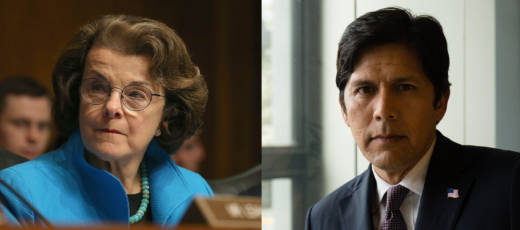"I just hope he has the ability to learn and to change, and if he does he can be a good president," she told an audience at the Commonwealth Club. "And that’s my hope."
That comment stirred howls of criticism among Democrats in a state that voted for Hillary Clinton 2-1 over Trump. And it prompted de León -- who was then leader of the state Senate -- to challenge Feinstein. At the state Democratic convention earlier this year, de León referenced Feinstein’s conciliatory comments about Trump.
"We demand passion, not patience," he told the friendly crowd. "We speak truth to power. And we’ve never been fooled into believing that Donald Trump could be a good president."
Feinstein got a much cooler reception from this decidedly liberal convention, whose delegates snubbed her by giving de León 54 percent of its votes for an endorsement, to 37 percent for Feinstein. De León fell short of the 60 percent needed for an official party endorsement, but the vote was nonetheless an embarrassment for Feinstein, and it made national news.
Since then, the veteran senator has stepped up her criticism of Trump and voted against many of his judicial and Cabinet nominees.
Asked this week whether she thought Trump could still be a good president, Feinstein had this to say: "I don’t believe that a president that lies is a good president. You have the feeling that there is a lack of stability coming out of the White House."
Since the more liberal de León jumped into the race, Feinstein -- who at age 84 is the oldest member of the Senate -- has abandoned some of her more conservative positions on drugs, capital punishment and health care.
But, says Democratic consultant Garry South, Feinstein has been slow to keep up with the state’s changing politics.
"The political terrain in California has moved considerably to the left since Dianne Feinstein was first elected in 1992 on everything from gay marriage to recreational marijuana -- you name it," South said. "She's viewed by a considerable part of the Democratic base as being out of sync with where her state has moved."
But Feinstein rejects the notion that she has suddenly changed positions on capital punishment, pot and health care for political reasons. "I know what I stand for," she said this week. "I’ve represented this state for a substantial period of time and hope to continue to do so with energy and enthusiasm."
The recent mass shootings in Las Vegas, Florida and Texas have given Feinstein a chance to tout her longtime support for stricter gun control on a national stage.
De León has championed gun control, along with bills to fight climate change and protect immigrants here illegally.
Yet despite his liberal record and son-of-immigrants biography, de León has struggled to catch on with Democrats. Adding to the challenge, says Berkeley IGS pollster Mark DiCamillo, is that this race is being overshadowed by the hotly contested campaign for governor.
"I think if you probably asked a straight question about, is there a U.S. Senate election this year, a good chunk of likely voters would not be aware of it," DiCamillo said. Still, under California’s top-two primary system, de León believes he’d have a decent shot against Feinstein in November if he can just come in second next week.
"Because once that happens the dynamic changes completely," de León said. "I feel like if we get the number two slot, then resources will start coming in."
And with roughly 10 percent the cash on hand that Feinstein has, de León badly needs the campaign cash. But whether donors would be willing to place a bet against someone with Feinstein’s stature and seniority remains to be seen.
The Berkeley IGS poll was conducted online May 22-28 with 2,106 voters.
